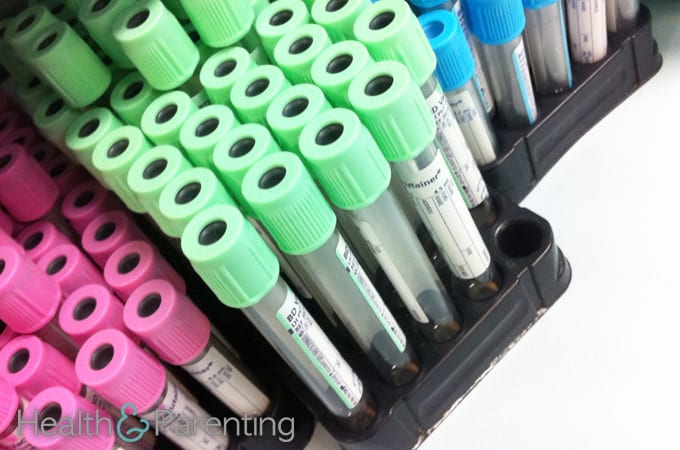During the first trimester of your first pregnancy, you may feel a bit like a human pincushion as your healthcare provider carries out tests to ensure you and your developing baby are both healthy.
At your first appointment, you will be given a full physical. This will involve answering lots of questions about your medical history, talking about your lifestyle and how the pregnancy is going. You may be offered a pelvic exam including a routine culture to check for chlamydia and gonorrhea. If it has been a while since your last PAP smear, you may be offered one to check for abnormal cells.
Blood tests
Samples of your blood will be taken to identify your blood type and Rh status. Blood samples will also be taken to test for anaemia, syphilis, Hepatitis B and HIV. Your blood will also be checked for immunities to certain illnesses including rubella, toxoplasmosis and chickenpox. Speak to your healthcare provider to determine what your blood is being tested for, as this can vary between providers.
Urine samples
At each appointment, your healthcare provider will ask for a sample of your urine. A dipstick test will then be performed on the sample to determine sugar and protein levels in your urine. High levels of these may be indicative of conditions including urinary tract infections, preeclampsia and gestational diabetes. If you are at a high-risk of developing gestational diabetes, your healthcare provider may check for this at your first appointment.
First trimester screening
A first trimester screening test may be carried out between weeks 9 and 14. This test combines the use of ultrasound and blood screening. This test is used to identify the risk of your baby having Down syndrome, congenital heart problems and some other chromosomal disorders. This test will not give you a definite result, but it can highlight an increased risk that may lead you to investigate further testing.
Depending on your ethnic and medical backgrounds, you may be offered a carrier test to determine your baby’s risk of developing genetic disorders such as cystic fibrosis, sickle cell disease, and Tay-Sachs disease.
Chorionic Villus Sampling
You have the option of a Chorionic Villus Sampling (CVS) between weeks 11 and 12. This test is invasive and should only be performed if necessary due to the slight risk of miscarriage associated with this procedure. CVS checks for chromosomal and genetic disorders. During the test, cells will be removed from the placenta and sent to a lab for testing.
Written by Fiona, proud owner of a toddler, @fiona_peacock
This information is not intended to replace the advice of a trained medical doctor. Health & Parenting Ltd disclaims any liability for the decisions you make based on this information, which is provided to you on a general information basis only and not as a substitute for personalized medical advice. All contents copyright © Health & Parenting Ltd 2017. All rights reserved.










